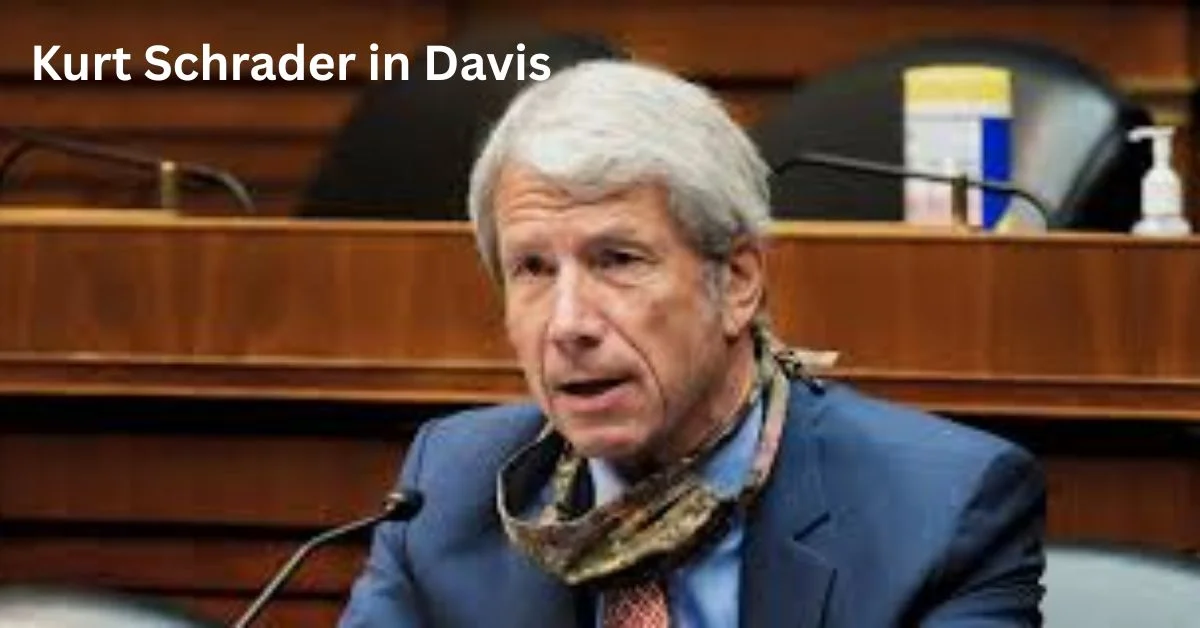The name Kurt Schrader carries weight in American politics, particularly for those familiar with moderate Democratic positions, pharmaceutical pricing debates, and rural-agricultural interests. But in 2025, a new thread of curiosity has surfaced: Kurt Schrader in Davis. Whether people are searching due to a town hall appearance, a policy forum, or ongoing academic involvement, this pairing has generated questions across local and digital communities.
Who Is Kurt Schrader?
Kurt Schrader is a former U.S. Representative who served Oregon’s 5th congressional district from 2009 to 2023. Known as a centrist Democrat, Schrader built a reputation around bipartisan policy crafting, especially in the realms of:
- Healthcare reform
- Agricultural policy
- Rural economic development
- Prescription drug pricing
His political style balanced fiscal moderation with socially liberal stances, placing him often in negotiation rooms between hardline party divisions. After losing his primary in 2022, many assumed Kurt Schrader would step back from public life. But his recent appearances suggest a shift toward policy education, regional advisory roles, and cross-state advocacy.
Why Davis?
Davis, California is not a random location. It is a university town, home to UC Davis, one of the leading agricultural and environmental research institutions in the world. The city also boasts a politically active population, a thriving progressive community, and a deep interest in climate, health, and food system reforms.
Kurt Schrader’s background as a veterinarian, farmer, and legislator makes his connection to Davis intellectually and strategically coherent. As of 2025, he has been:
- A guest lecturer at UC Davis School of Veterinary Medicine and Agricultural Economics
- A visiting policy fellow in a bipartisan think tank based at UC Davis
- An informal advisor on regional food resilience initiatives in California
These roles are not elected but influential, positioning Kurt Schrader as a nonpartisan policy bridge between local action and federal legacy.
Engagement with Local Policy Forums
One of the clearest indicators of Schrader’s involvement has been his participation in Davis-based policy forums and symposiums. Since 2023, he has appeared at:
- California Food Futures Roundtable on agricultural policy
- Affordable Care in the Central Valley workshop
- Davis Regional Forum on Climate and Agri-Resilience
Attendees report that Kurt Schrader often speaks from a legislative lens, offering insights into the limits and possibilities of policy from Capitol Hill—but framed for local leaders and student audiences.
His presence in these forums indicates a shift from legislating to facilitating public understanding, particularly in translating federal policy into actionable local contexts.
Academic and Institutional Collaboration
In collaboration with UC Davis, Kurt Schrader has contributed to:
1. Policy White Papers
Co-authoring analysis on:
- Supply chain resilience in perishable agriculture
- Cross-state health policy alignments
- Federal investment strategy for rural America
2. Graduate Seminars
He’s known for engaging directly with students, particularly in public policy and veterinary science programs, focusing on the real-world frictions between science, politics, and governance.
3. Think Tank Affiliation
As of 2025, Schrader holds a fellowship with the California Civic Innovation Lab, a UC-affiliated body focused on cross-jurisdictional problem-solving.
Davis as a Microcosm of National Issues
Kurt Schrader’s work in Davis underscores how local communities serve as testing grounds for national policy adaptation. His interests in Davis mirror national concerns:
- Affordable healthcare: The cost of living and limited rural health access in Central California mimic national health equity issues.
- Agriculture and climate: Water policy, sustainable farming, and carbon offset markets remain bipartisan pressure points.
- Public trust in institutions: Schrader often cites Davis as a case study in science-driven civic planning.
In many ways, Davis functions not just as a location but as a symbolic venue for Schrader’s post-congressional mission: to re-engage politics through knowledge and practical localism.
The Broader Strategy: Post-Congressional Influence Without Office
Schrader’s work in Davis aligns with a broader trend of post-office public figures reshaping their legacies through education and advisory roles. Like former senators or governors who turn to universities or NGOs, Schrader is shifting from:
- Passing legislation to mentoring future policymakers
- Campaign rhetoric to nuanced discourse and technical feedback
- Electoral cycles to long-horizon thinking
His time in Davis gives him space to speak freely, with less partisan constraint, but with direct access to rising political and scientific voices.
Reception in Davis: Mixed or Mutually Beneficial?
Reactions to Schrader’s presence have varied:
- Academic leaders praise his practical insight and willingness to challenge ideological binaries.
- Progressive students express skepticism, noting his past votes against some party-line reforms.
- Local civic groups appreciate his willingness to engage outside traditional political spheres.
What emerges is a productive tension: Davis is not a constituency to be courted, but a collaborative space to test ideas and revisit legacy. For Schrader, this is both reputational recalibration and civic contribution.
Key Themes in Schrader’s Public Talks
From transcripts and participant notes, several recurring themes have emerged in his public appearances:
- “Don’t legislate in a vacuum.” His call for science-informed policy, grounded in lived experience.
- “Policy is about practice, not purity.” He critiques the rise of ideological litmus tests.
- “Rural voices matter.” Even in California, he argues, the rural-urban divide shapes outcomes more than party lines.
These themes resonate deeply in Davis, where the blend of academic analysis and real-world policy impacts is central.
Conclusion
Kurt Schrader in Davis may not headline national broadcasts, but it symbolizes a deeper shift in American political life—from performative partisanship to pragmatic, informed engagement. His work here doesn’t rely on votes or approval ratings; it draws strength from shared curiosity, institutional partnership, and the conviction that local knowledge can inform national renewal.
For Davis, his presence adds a seasoned voice to complex policy conversations. For Schrader, the town provides a stage for a second act grounded in mentorship, experimentation, and civic reinvestment.
In an age where trust in politics wanes and new leadership models are sought, the link between Kurt Schrader and Davis represents more than geography. It represents a possible model of how politics can evolve when it listens more, preaches less, and roots itself in communities ready to build.
Frequently Asked Questions (FAQs)
1. Why is Kurt Schrader in Davis, California?
Schrader is involved in academic, advisory, and public policy roles—collaborating with UC Davis and local policy forums.
2. Is Schrader planning to run for office in California?
As of now, there are no indications he is pursuing elected office. His work is educational and advisory in nature.
3. What kind of policy work is he doing in Davis?
He focuses on agriculture, rural healthcare, and supply chain policy—often with UC Davis researchers and student groups.
4. Can the public attend events where Schrader speaks?
Yes, many events are open to the public or streamed online through university or community platforms.
5. Does his presence in Davis affect local politics?
Indirectly. While not politically active in a traditional sense, Schrader contributes to civic dialogue and knowledge exchange.
For more information, click here.









